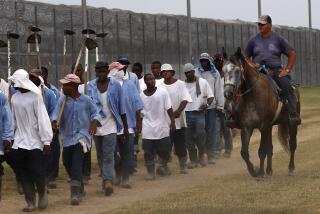Brazil prisoners ride bikes toward prison reform
SANTA RITA DO SAPUCAI, Brazil — Muscular young men in red jumpsuits hunch over a set of matching stationary bicycles, sweating and panting. A few more wait to take over when the first group is too tired to go on. They keep the wheels turning nonstop, eight hours a day, seven days a week.
They aren’t a cycling team training for the 2016 Summer Olympics, which will take place in nearby Rio de Janeiro. They are a group of convicts riding for their freedom.
The bikes are hooked up to portable batteries, which light up the humble boardwalk along this small country town’s river each night. For every three days of doing stints on the bike, the men shave one day off their sentences. In its first months, the program has proved so popular that guards have reported a jump in good behavior, which moves candidates to the top of the waiting list.
PHOTOS: Brazilian inmates’ pedal power “It’s good for me,” says Carlos Roberto Lopes, pointing to his fast-beating heart. He’s serving four years in the town’s prison for armed robbery and kidnapping. “It’s healthy, and I feel like I’m accomplishing something. It’s hope. I’ll see my family sooner.”
The cycling isn’t easy and usually takes place, as today, under an unforgiving sun. But those who qualify seem happy being outside, relatively free; it’s better than languishing in the country’s crammed concrete cells, where most of Brazil’s 550,000 incarcerated sit idle 22 hours a day.
This is a country with a famously troubled prison system, in which overcrowding and violence are common, HIV spreads unchecked and the threat of deadly riots is constant. Santa Rita do Sapucai has become an unlikely focal point of a movement to improve conditions.
It all began when a local judge, Jose Henrique Mallman, ran an absent-minded Google search for “renewable energy.”
After arriving here last year from another small town, Mallman had gotten into an old habit of using his spare time to develop small, sometimes offbeat, programs for the community.
He was interested in getting the prisoners to help improve the town and came across the bicycle electricity program online. In his career as a lawyer and 10 years as a judge, he says he became convinced, like many others, that the penal system did nothing to reduce crime.
“The system has totally failed us. Jails have become a human depository and nothing else. Men waste away sitting in there, just discussing criminal strategies, and come out exactly the same or worse,” he says in his office, decorated with art created by prisoners.
After seeing a video of a gym that used spinning to generate electricity, he hooked a bike up to a battery and took it to a river downtown. It kept one lamp on.
Now, four bikes are going from 9 a.m. to 6 p.m. every day, charging batteries to power 10 lamps. Inmates cycle for 30 to 45 minutes, rest and cycle again. The nine or 10 people in the program each spend about three hours a day generating electricity.
Far more inmates have demonstrated good enough behavior to qualify than there are seats, so who gets a spot is up to the warden. Soon there will be 10 bikes powering 34 lamps. A few beaten-up old models are waiting to be painted red and tooled up.
Mallman’s bicycle program already is set to be adopted around the country, and he has been called to Brasilia, the capital, to advise lawmakers on prison reform programs.
As Brazil has emerged as an economic power in the last decade, large tourist-friendly cities such as Rio de Janeiro and Sao Paulo have seen crime, including homicides, fall. But that has been offset by increasing problems in smaller, more remote locales, often linked to the drug trade.
Despite sitting in a town of fewer than 50,000 people, Mallman’s little courthouse is hearing another murder trial on this day, evidence that Brazil’s homicide rate still remains higher even than Mexico’s amid its drug war.
If the murder suspect is convicted, “he could be a candidate for another one of our programs,” jokes Mallman, who has a mischievous smile even as he discusses some of Brazil’s most harrowing problems. He wears what is the legal uniform in much of small-town Brazil: an ill-fitting, slightly oversize suit.
Now that his bicycle program is in place, he is keen to import another headline-grabbing idea, recently put in place at maximum-security federal prisons. As soon as a suitable teacher is found for his prison, inmates will be given days off for reading and submitting book reports, or in some cases, making progress toward learning to read.
In the meantime, he has launched plenty of other programs. The courthouse just received a fresh coat of old-timey green and white paint, expertly applied by convicts. As Mallman speaks, three prisoners are making repairs in the building, part of another program. They are paid a little under minimum wage, half of which goes toward paying restitution to victims.
A few blocks down from the town square, past the church, the ice cream shop and countless old men sitting on the benches, another convict is landscaping the path along the river. No one bothers him, or watches him, until prison director Gilson Rafael Silva chances upon him and strikes up a friendly chat.
“We are trying to give them an opportunity to be active, to learn something or do some work,” Silva says. “We want to try something, because everyone knows the current system doesn’t work.”
The horrors of the Brazilian prison system are well known here. In the 1990s, police at the Carandiru penitentiary, then South America’s largest, gunned down more than 100 inmates to end a revolt. In 2006, a dispute over conditions led a powerful criminal group to order — from behind bars — a full-scale attack on police in Sao Paulo, killing dozens and paralyzing the city with fear.
Criticism of the status quo is found at the highest levels of government.
“As a result of the poor system, the prisoners end up having many of their rights stripped of them: the right to health, the right to legal representation,” says Ana Paula Diniz de Mello Moreira, coordinator in Brasilia of a presidential program to combat torture, a job that frequently involves investigating prisons.
Poor conditions and treatment often amount to physical and psychological torture, she says, in addition to the fact that as many as 35% of prisoners are awaiting conviction in severely overcrowded cells.
Making matters worse, the country’s prison population is expected to jump to 850,000 in the next few years, and estimates suggest that more than 80% of those released go on to commit more crimes.
“Anything that gets the prisoners involved, that gives them some kind of activity or gives them a chance at education, will increase the likelihood they will re-socialize,” De Mello Moreira says. “It’s very unlikely they’ll reenter legal society if they have no alternatives.”
Here in the prison in Santa Rita do Sapucai, there are just over a hundred men, and a few women in a separate part of the compound. The inmates include murderers, rapists and drug traffickers. Many are serving 30-year sentences, the maximum in Brazil.
Only about half are allowed anywhere near the bikes, Silva says. But even many of those considered trustworthy can sometimes look menacing with their shaved heads, tattooed bodies and white socks pulled up high.
“This is great for me, no doubt about that,” says Duardo Amaro, 27, who is serving 18 months for possession of cocaine with intent to distribute. Amaro, muscular and, like most prisoners, with dark hair cropped short, rides the bikes as much as possible. “It keeps my mind occupied. I need that.”
As for Mallman, he has taken to his role as social critic with gusto.
“For too long, no one has wanted to discuss these problems, and society has just wanted to keep prisoners imprisoned, period,” Mallman says. “But that has just left us sitting on a time bomb. And those of us in the correctional system have had it explode in our faces, over and over.”
Bevins is a special correspondent.
More to Read
Go beyond the scoreboard
Get the latest on L.A.'s teams in the daily Sports Report newsletter.
You may occasionally receive promotional content from the Los Angeles Times.






